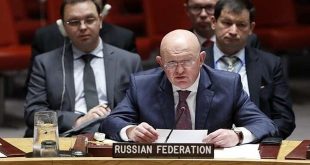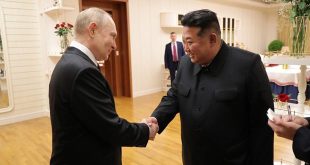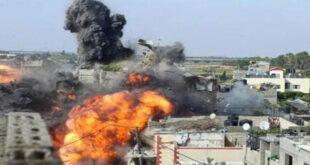New York, SANA- Russia and China vetoed a western draft resolution at UN Security Council that imposes sanctions on Syria.
The draft resolution was proposed by UK, France and the US.
Nine countries voted in favor of the draft resolution. Russia, China and Bolivia opposed it while Egypt, Ethiopia and Kazakhstan abstained.
Munzir: Syria couldn’t use chemical weapons
Speaking at the UNSC session, Acting Charge de’ Affairs of Syria’s permanent delegation to the UN Munzir Munzir said that Syria would never use chemical weapons and it doesn’t believe in using them from a moral point of view, adding that the Syrian government has cooperated with the inquiry committees and proved to them, through evidence, that the terrorist organizations fabricated the allegations about the use of chemical weapons.
Munzir said that the mechanism of joint investigation has openly admitted that armed terrorist groups have moved and transformed the material evidences from one place to another and photographed events after many days of their happening without an attempt by the mechanism to analyze the motive behind these practices, which clearly aim at falsifying the facts and fabricating accusations against the Syrian governments.
He reiterated that the Syrian government categorically rejects the accusations included in the reports of the Joint Investigative Mechanism (JIM), asserting that Syria continues in implementing all its pledges that have committed to when it joined the Chemical Weapons Convention.
The Syrian diplomat accused the representatives of the US, UK, and France of not being concerned with truth as much as serving their agendas and allegations, wondering about the strategic feasibility behind using chemical weapons against a limited number of gunmen, and he also wondered why Syria did not use those weapons when the terrorist groups attacked the airports, major cities, and military bases in many places in Syria.
Munzir asserted that the US, UK, and France reflect by submitting the draft resolution their moral, legal, and political fall and that they are not actually interested in easing the suffering of the Syrian people, and he went on to accuse these countries of attempting to foil the political process currently underway in Geneva as they seek to poison the international atmosphere and hinder any genuine efforts that would enable the Syrians to reach a political solution without foreign interference.
Syria joined the Organization for the Prohibition of Chemical Weapons (OPCW) due to its faith and efforts to clear the Middle East area from all weapons of mass destruction, but it is ironic that the Syrian efforts are faced today by the opposition of those three countries that stand behind the draft project with the aim of protecting the Israeli nuclear, chemical, and biological arsenal, he elaborated.
Munzir pointed out that the Syrian government has repeatedly warned against the dangers of using chemical weapons against the civilians by the armed terrorist group, particularly those linked with the ISIS, Jabhat al-Nusra, and Al Qaeda, clarifying that the draft resolution ignored the fact that the Syrian Arab Republic handed over all toxic chemical materials it had possessed to the OPCW inspectors and those materials were destroyed in the UK and other European countries and on US Navy ships.
The diplomat affirmed that the Syrian government has cooperated fully with all requirements of the investigation that was conducted by international committees since 2014 till now, and offered all facilitations to conduct honest and credible investigations, as it proved by scientific evidence and testimonies that some terrorist groups fabricated and falsified such events.
He affirmed that Syria denounces the intention of some Security Council member states to continue their cheap political exploitation of the reports of UN missions and committees, asserting that the JIM failed to offer concrete or true evidence on the usage of chlorine gas as its mechanism lacked professionalism and didn’t commit to the OPCW criteria in conducting investigations and collecting evidence and examining it.
In the same context, Russia’s Deputy UN Ambassador Vladimir Safronkov said in a speech following the voting session that the conclusions of experts about allegations of using chemical weapons by the Syrian government against civilians in 2014 and 2015 are based on suspicious data.
“The problem lies in the fact that the work of experts was based on suspicious data presented by armed groups and non-governmental international organizations in addition to media and so-called friends of Syria,” Safronkov said, adding that Damascus demands for conducting an objective investigation were neglected.
He considered that the information available to the sides which proposed the draft resolution don’t include “irrefutable facts” that could be the basis for any accusations.
For his part, China’s Permanent Representative to the UN Liu Jieyi said that the UN Security Council should take into account before any action against Syria the necessity of maintaining the cessation of hostilities, finding a political process to the crisis in it, working to fight terrorism, offering humanitarian aid to the Syrian people, and restoring stability to Syria.
English bulletin
 Syrian Arab News Agency S A N A
Syrian Arab News Agency S A N A




